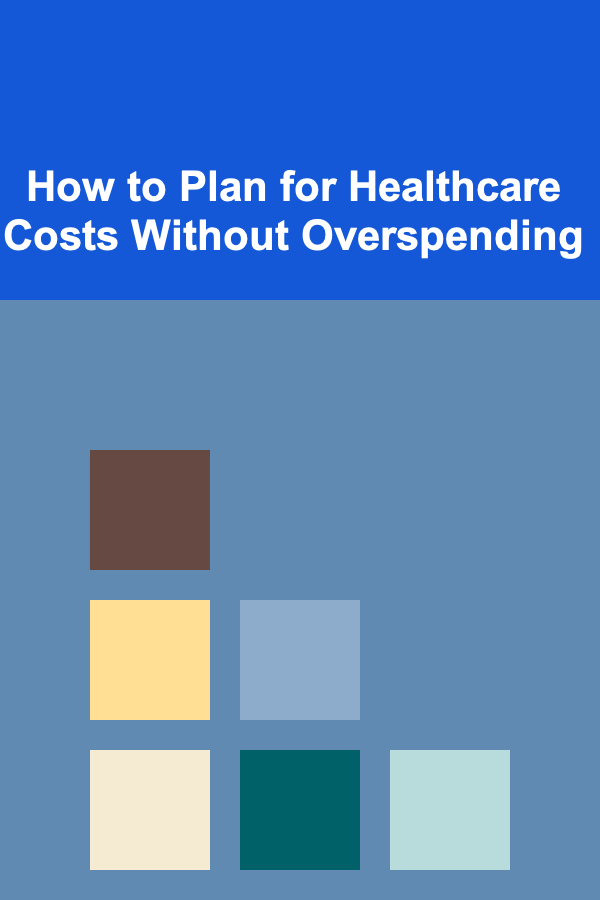
How to Plan for Healthcare Costs Without Overspending
ebook include PDF & Audio bundle (Micro Guide)
$12.99$8.99
Limited Time Offer! Order within the next:

Healthcare costs can be a major source of financial stress for individuals and families. Whether it's regular doctor visits, unexpected medical emergencies, or long-term treatments, the costs associated with healthcare can quickly add up. In the U.S., for example, healthcare spending is one of the largest household expenses, yet many people are unprepared for the financial burden it may place on them.
Planning for healthcare costs requires strategic thinking, discipline, and a thorough understanding of the healthcare system, insurance options, and how to make cost-effective decisions about your health. By taking a proactive approach, you can avoid the trap of overspending while still ensuring that your healthcare needs are met.
In this article, we will explore how to plan for healthcare costs without overspending. We will look at practical tips, strategies, and tools that can help you manage medical expenses without breaking the bank.
Understanding the Landscape of Healthcare Costs
Before diving into the planning process, it's essential to have a clear understanding of the various components of healthcare costs. Healthcare expenses can broadly be divided into two categories: predictable and unpredictable.
Predictable Healthcare Costs
These are the costs you can foresee with reasonable certainty. They include:
- Health insurance premiums: The monthly fee paid for health insurance coverage.
- Co-pays and deductibles: The amount you pay out of pocket for healthcare services before insurance begins to cover costs.
- Routine care: Regular check-ups, vaccinations, screenings, and prescriptions.
- Specialized treatments: Planned medical treatments or surgeries, including rehabilitation.
Unpredictable Healthcare Costs
These are costs that are harder to predict and can arise unexpectedly. Examples include:
- Emergency room visits: Due to accidents, sudden illnesses, or unexpected health issues.
- Hospitalization costs: If you require an extended stay in a hospital for an emergency or chronic condition.
- Long-term care: Expenses for ongoing care due to aging, illness, or disability.
- Prescription drugs: Especially for people with chronic conditions that require expensive medications.
Both categories demand careful attention and strategic planning to avoid overspending.
Step 1: Choose the Right Health Insurance Plan
A significant portion of your healthcare costs will likely come from your health insurance plan. When selecting insurance, it's essential to match your plan with your medical needs and financial situation. Choosing the wrong plan could result in higher premiums or unexpected out-of-pocket expenses.
Consider Different Types of Health Insurance Plans
- Health Maintenance Organizations (HMOs): These plans require you to choose a primary care physician (PCP) and get referrals for specialists. They tend to have lower premiums but offer less flexibility.
- Preferred Provider Organizations (PPOs): These plans offer more flexibility in choosing healthcare providers, but they come with higher premiums.
- High Deductible Health Plans (HDHPs): These plans offer lower premiums but higher deductibles. They can be a good option if you're generally healthy and don't expect frequent medical care.
- Health Savings Accounts (HSAs): Paired with HDHPs, HSAs allow you to set aside tax-free money for medical expenses. They can be a smart way to save for healthcare costs in the future.
Evaluate Plan Networks and Coverage
Make sure that your preferred doctors, hospitals, and medications are included in your insurance network. Plans with broad networks offer more choices, but they might come at a higher cost. Also, carefully review the coverage limits, as some plans may not cover certain services or medications, leaving you with large out-of-pocket expenses.
Consider Preventive Care and Wellness Programs
Many health insurance plans offer preventive care services like free vaccinations, screenings, and wellness check-ups. Taking advantage of these services can help prevent future health issues and reduce the likelihood of costly medical procedures down the road.
Step 2: Set Up a Healthcare Savings Fund
One of the most effective ways to manage healthcare costs without overspending is by setting aside money in advance for both predictable and unpredictable healthcare expenses.
Open a Health Savings Account (HSA) or Flexible Spending Account (FSA)
- Health Savings Account (HSA): If you have a high-deductible health plan (HDHP), an HSA is an excellent way to save for healthcare expenses. Contributions to HSAs are tax-deductible, and the funds grow tax-free. The money can be used for eligible medical expenses, including doctor's visits, prescriptions, and dental care.
- Flexible Spending Account (FSA): An FSA allows you to set aside pre-tax money for healthcare expenses. Unlike an HSA, the money in an FSA must be used by the end of the year or it will be forfeited, so careful planning is necessary.
Budget for Healthcare Costs
In addition to setting up an HSA or FSA, it's crucial to budget for healthcare costs. Consider including healthcare expenses in your regular budget alongside rent, groceries, and other necessities. Make sure to allocate money for:
- Annual premiums for health insurance.
- Co-pays and deductibles that you may have to pay before your insurance kicks in.
- Out-of-pocket costs for prescription medications, doctor visits, and other health-related expenses.
This budget will help you avoid financial surprises and ensure that you have enough saved to cover healthcare costs.
Save for Large Medical Expenses
Some medical expenses, such as surgeries or long-term treatments, can be difficult to predict. For these types of expenses, it's important to have a separate emergency healthcare fund in place. Depending on your health, this fund could range from a few thousand dollars to much more. Start saving early, so you're prepared in case of an unexpected medical issue.
Step 3: Understand Prescription Costs
Medications can represent a significant portion of your healthcare spending. Managing prescription drug costs without overspending is crucial for keeping your healthcare budget under control.
Shop Around for the Best Prices
Prescription drug prices can vary widely between pharmacies, so it's a good idea to shop around. Use websites or apps like GoodRx, which compare prices at local pharmacies and offer discounts on many medications. If your doctor prescribes a brand-name drug, ask if there's a generic version available. Generic drugs are typically much cheaper but just as effective as brand-name medications.
Use Prescription Discount Programs
Many pharmacies and drug manufacturers offer discount programs or patient assistance programs that can help reduce the cost of medications. These programs may be available for low-income individuals, seniors, or those who do not have insurance.
Consider Mail-Order Pharmacies
Mail-order pharmacies can be a cost-effective option, especially for those who need long-term medications. They often offer discounts for bulk orders, and shipping is free. If your insurance plan covers mail-order prescriptions, this could be an excellent way to save money on medications.
Step 4: Utilize Preventive Care
Preventive care is often one of the best ways to reduce overall healthcare costs. By staying healthy and catching problems early, you can avoid expensive treatments down the road.
Take Advantage of Free Preventive Services
Many health insurance plans cover preventive care at no additional cost. This includes:
- Vaccinations for flu, pneumonia, hepatitis, etc.
- Cancer screenings like mammograms, colonoscopies, and skin checks.
- Routine check-ups to monitor vital signs like blood pressure, cholesterol, and blood sugar.
By staying up-to-date with preventive care, you not only protect your health but also avoid the need for costly medical interventions in the future.
Maintain a Healthy Lifestyle
Investing time and effort into maintaining a healthy lifestyle can also help you avoid high healthcare costs. Regular exercise, a balanced diet, and adequate sleep can reduce the risk of chronic conditions such as heart disease, diabetes, and obesity, all of which are costly to manage and treat.
Step 5: Shop Around for Healthcare Services
Healthcare costs can vary widely depending on the provider and location. It's worth doing some research before seeking care.
Use Online Tools to Compare Prices
Websites like Healthcare Bluebook and Fair Health Consumer allow you to compare the costs of common medical procedures in your area. These tools can give you an idea of what you should expect to pay for various services, from lab tests to surgeries.
Negotiate with Providers
If you have a large medical bill, don't hesitate to negotiate with your healthcare provider. Many providers are willing to offer discounts or payment plans, especially if you're paying out of pocket or have financial difficulties. Don't be afraid to ask for a better rate or inquire about financial assistance programs.
Step 6: Seek Financial Assistance
If you find yourself struggling with medical bills, several programs can provide assistance.
Government Assistance Programs
In the U.S., programs like Medicaid and Medicare can help low-income individuals and seniors with healthcare costs. Eligibility varies by state and income level, but if you qualify, these programs can significantly reduce out-of-pocket medical expenses.
Charity Care Programs
Many hospitals and healthcare providers have charity care programs that provide financial assistance to individuals with low incomes. Be sure to inquire about these programs when seeking treatment.
Medical Bill Advocacy Services
If you're overwhelmed with medical debt, medical bill advocacy services can help you negotiate with healthcare providers and insurers to reduce your debt. These services often have experience working with insurance companies and medical billing departments to ensure you're not overcharged.
Conclusion
Healthcare costs can be a significant burden, but with careful planning, you can manage these expenses without overspending. By choosing the right health insurance, setting up healthcare savings accounts, understanding prescription costs, utilizing preventive care, and shopping around for services, you can take control of your healthcare finances.
Additionally, by staying disciplined in budgeting for healthcare and using available financial assistance programs, you can avoid unnecessary financial strain while ensuring that you and your family receive the care you need. Proper healthcare planning not only protects your financial health but also ensures that you can access the medical treatments necessary to maintain your physical health.
Reading More From Our Other Websites
- [Home Lighting 101] How to Use Ambient Lighting to Create Mood and Atmosphere in Every Room
- [Home Family Activity 101] How to Build a Creative DIY Puppet Show Stage and Characters from Recycled Materials
- [Personal Financial Planning 101] How to Reduce Financial Stress and Improve Your Mental Well-being
- [Organization Tip 101] How to Store Paints and Brushes for Kids' Projects
- [Home Budget Decorating 101] How to Design DIY Backsplash Ideas That Add Style to Your Kitchen
- [Trail Running Tip 101] How Nature's Beauty Fuels Your Best Trail Running Performances
- [Home Budget 101] How to Prepare Your Home Budget for a Pet Adoption: Beyond the Initial Costs
- [Personal Care Tips 101] How to Keep Your Hair and Nails Healthy
- [Personal Care Tips 101] How to Combine Teeth Whitening Strips with Other Whitening Products
- [Gardening 101] The Best Garden Books for Every Type of Gardener

How to Build a Checklist for Post-Hire Evaluation and Feedback
Read More
How to Save for a New Car Within Your Home Budget
Read More
Software Architect's Toolkit: Essential Tools and Techniques for Creating Robust Systems
Read More
How to Master Iron Condors
Read More
How to Track Utilities Expenses and Budget Effectively
Read More
How to Handle Travel Emergencies and Client Concerns
Read MoreOther Products

How to Build a Checklist for Post-Hire Evaluation and Feedback
Read More
How to Save for a New Car Within Your Home Budget
Read More
Software Architect's Toolkit: Essential Tools and Techniques for Creating Robust Systems
Read More
How to Master Iron Condors
Read More
How to Track Utilities Expenses and Budget Effectively
Read More